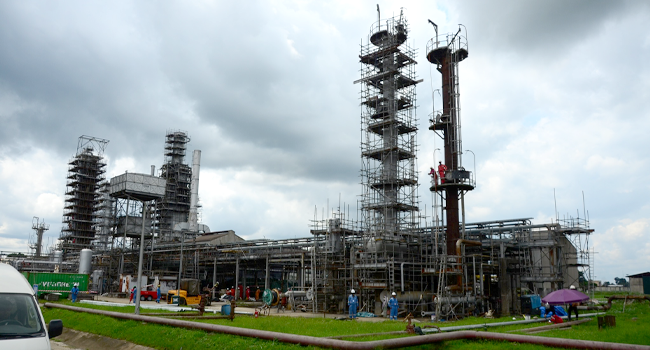In a groundbreaking move, the Nigerian government has partnered with two prestigious Scottish universities to transform research and development in the country’s oil and gas sector.
The agreement, signed in Aberdeen and Glasgow, marks a new chapter in Nigeria’s quest to develop homegrown expertise in the energy industry.
Through the Petroleum Technology Development Fund (PTDF), the government finalised a memorandum of understanding with Robert Gordon University (RGU) in Aberdeen and the University of Strathclyde in Glasgow.
This initiative will empower Nigeria’s College of Petroleum and Energy Studies in Kaduna to deliver world-class education and research for the oil and gas sector.
“This collaboration underscores our commitment to bridging the gap between global best practices and local capacity,” declared Senator Heineken Lokpobiri, Nigeria’s Minister of State for Petroleum Resources (Oil).
He emphasised that the agreement would lay the groundwork for a self-sustaining oil and gas sector, driven by highly skilled Nigerians.
The PTDF Executive Secretary, Ahmed Galadima Aminu, was also present at the signing ceremony. He formalised the partnership by signing the agreement with the Scottish institutions, heralding it as a major step forward.
“The PTDF has consistently ensured the training of manpower equipped with world-class knowledge in various disciplines,” Aminu stated.
According to him, the agreement would help local scholars achieve the same global standards as their counterparts trained abroad.
The Kaduna-based College of Petroleum and Energy Studies is at the heart of this initiative.
The college, already an important institution in Nigeria’s oil and gas education, is now set to become a centre of excellence for innovation and research.
“By bringing these knowledge transfer programs home, we are laying the foundation for a self-sustaining oil and gas sector,” Lokpobiri added.
The deal promises to strengthen academic exchange and facilitate technology transfer between Nigeria and the Scottish universities.
Nneamaka Okafor, Special Adviser to the Petroleum Minister, described the development as a significant milestone.
She noted that it aligns with PTDF’s reform agenda, which focuses on fostering sustainable growth in the energy sector.
Prof. Steve Olivier, Vice-Chancellor and Principal of RGU, expressed excitement about the collaboration.
“We are proud to continue our longstanding relationship with PTDF,” he said.
He added that the partnership would ensure the Kaduna college becomes a hub for innovation and excellence in Nigeria’s energy sector.
Similarly, Prof. Sir Jim McDonald, Principal of the University of Strathclyde, hailed the agreement as transformative.
“This collaboration is a testament to the power of global partnerships in transforming education and industry,” he said.
He also highlighted the importance of building a brighter future for Nigeria’s energy sector through shared knowledge.
Observers have described this agreement as a landmark achievement in Nigeria’s efforts to reform its oil and gas industry.
The country has long depended on foreign training for its energy professionals.
However, this deal signals a shift toward developing local capacity and reducing reliance on overseas institutions.
The College of Petroleum and Energy Studies is expected to play a pivotal role in this transformation.
Its upgraded curriculum, supported by the expertise of Scottish educators, will provide cutting-edge training to Nigerian scholars.
The college’s focus will not only be on academics but also on practical skills, ensuring graduates are industry-ready.
Industry experts believe the partnership will help Nigeria address key challenges in its energy sector.
These include outdated technology, a lack of skilled personnel, and dependence on imported solutions.
“This is the kind of initiative Nigeria needs to achieve energy independence,” said an Abuja-based oil consultant.
He praised the government’s foresight in investing in local talent development.
The partnership also underscores the importance of international collaboration in addressing global challenges.
With climate change and energy transition on the agenda, Nigeria must prepare its workforce for a rapidly evolving sector.
This agreement positions the country to compete globally while meeting local demands.
For the PTDF, this marks another milestone in its mission to advance Nigeria’s energy capabilities.
Over the years, the agency has sponsored numerous Nigerians for training abroad.
Now, it is focusing on bringing that expertise home.
“This is about creating a legacy of self-reliance,” Aminu stated.
The Kaduna college is expected to become a beacon of hope for aspiring energy professionals.
For many young Nigerians, it will offer opportunities that were once out of reach.
The deal also sends a strong message about Nigeria’s ambitions in the global energy market.
By investing in local capacity, the country is asserting its role as a key player in the oil and gas industry.
While challenges remain, this partnership is a step in the right direction.
As Senator Lokpobiri put it, “This is the future of Nigeria’s oil and gas sector.”
With this agreement in place, Nigeria is poised to harness its abundant resources and unlock its full potential.

